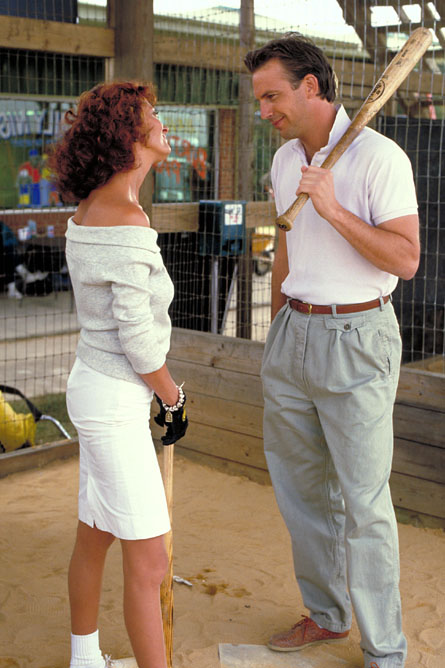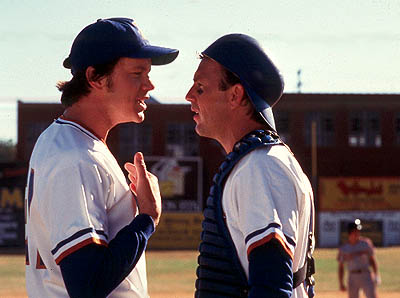From the Chicago Reader (July 1, 1988). Criterion has released an elaborately bonus-filled Blu-Ray of this comedy. — J.R.
BULL DURHAM
*** (A must-see)
Directed and written by Ron Shelton
With Kevin Costner, Susan Sarandon, Tim Robbins, Trey Wilson, Robert Wuhl, and Jenny Robertson.
I cannot tell a lie: Bull Durham gave me so much old-fashioned moviegoing pleasure the first time around, in spite of my complete lack of interest in baseball, that I wasn’t too concerned about the sources of my fun. Entertaining movies are often deft at discouraging reflection. But two weeks later, when I went back to see this one again — mainly to refresh my memory — I came out feeling a little embarrassed about how and why I’d been taken in.
It’s not that the movie doesn’t have its share of singular virtues, especially considering that it’s Ron Shelton’s first feature as a director (he also wrote the script). Genuine star performances — as opposed to those in hyped-up vehicles like Big, Red Heat, The Presidio, and Big Business — are not all that commonplace these days, and Shelton gets them here from both Kevin Costner and Susan Sarandon. He also strikes a very satisfying balance between the fast and furious dialogue — much of it slangy, staccato jargon that reflects Shelton’s ball-playing background — and the transitional montage sequences, overlaid with pop songs, that allow us to glide and drift between the gabfests.
A bright mythical sheen is brought to the movie by the metaphorical side of Sarandon’s offscreen narration, which links baseball to both religion and sex every chance it gets. The script might even be said to have some literary distinction, although, pace Pauline Kael, it certainly has nothing to do with the satire of Preston Sturges (who in some critical quarters has become an obligatory reference point for snappy comedy). Finally, in connection with the movie’s North Carolina setting and its jazzy vernacular, there’s the offbeat energy of southern folkways, accents, and rhetoric — a particular brand of Dixie jive that brings both spice and authenticity to the proceedings.
The only problem is that all of the above adds up to a kind of alluring gold dust that’s thrown in our eyes. While the movie purports to be “A Major League Love Story in a Minor League Town” (to quote the ads), it’s not entirely clear who the lovers in this match really are. Supposedly they’re Sarandon and Costner; but if that’s really the case, why does the movie lose much of its grip, its edge, and its focus when the two of them finally come together?
Sarandon plays ballpark groupie Annie Savoy, a southern eccentric who devoutly believes in “the church of baseball.” She watches every one of the local games from a seat behind first base — usually in the company of Millie (Jenny Robertson), a fellow groupie about half her age — and every spring she selects a favored player from the Durham Bulls to become her lover and spiritual advisee for that season. When the story opens, she’s narrowed her choice for the present season down to two candidates: Ebby Calvin LaLoosh (Tim Robbins) and Crash Davis (Kevin Costner).
LaLoosh is a young comer, a pea-brained but eager pitcher described in the movies press materials as “a fireballing bonus baby with a high hard one that cracks the radar gun at 98 on the rare occasions that it wanders near the strike zones” (sic). Crash Davis, wizened and a little morose, has spent most of his 12-year career as a catcher in the minor leagues, with one three-week stint in the majors. He’s been hired by the Bulls to “stay on” LaLoosh’s “case” — that is, to serve as his trainer and mentor — a job that irritates his professional pride. “You want a stable pony,” he gripes to the team manager. Soon after learning the role he is to play, Crash meets the cocky LaLoosh in a bar. An immediate competition builds up between them over Annie, and LaLoosh challenges Crash to a fight in the alley. Crash initially demurs, then psyches LaLoosh out — something he later proves to be adept at in the ballpark — and finally punches him out; then, in the classic manner of a Howard Hawks buddy movie, after this traditional macho barrier is crossed the two go off and have a drink together.
When Annie invites the candidates back to her house and explains the “ground rules” by which she will choose between them, Crash gets peeved — “I don’t do tryouts” — and leaves in a huff. Annie winds up tying a compliant LaLoosh to her bed, but instead of offering him sex, she reads to him from Whitman’s “I Sing the Body Electric.” Later, she nicknames him “Nuke,” for his sex drive.
The next day, at the ballpark, Annie and Crash exchange notes, but a subsequent meeting between them leads to another sexual stalemate — she sticks to one player per season and she’s already chosen Nuke, though she occasionally calls him Crash in the midst of their lovemaking. The film then focuses on the separate efforts of Crash and Annie to coach and develop Nuke, which come into conflict only when Nuke gets on a winning streak; he decides not to have sex with Annie for as long as it lasts, and she holds Crash responsible. Finally, Nuke gets his shot at the big leagues; when he finds Crash in a poolroom and tells him the news, Crash angrily provokes a second fight between them, and this time he gets punched out. Having outlived his usefulness as Nuke’s mentor, Crash finds that he no longer has a job. But Nuke’s departure finally brings him and Annie together.
Although Annie’s position as narrator keeps her at the center of the story, she’s a fairly hollow center, not much defined or elaborated beyond her mystical spiel and her quirky habits. The movie expends a lot of effort trying to convince us that her eventual coming together with Crash is pretty hot stuff: they roll off her bed onto the floor in the throes of passion; he ties her to the bed and paints her toenails; after a snack he mounts her on the kitchen table; they boogie the night away. But in terms of the movie’s emotional dynamics, most of this comes across as an anticlimactic postscript. The real heat of this movie comes from competition — Crash and Nuke’s competition over Annie, Crash and Annie’s competition over Nuke — and once Nuke leaves them both for the big leagues, there’s no longer a game to be played.
As far as the spectator’s interest is concerned, moreover, there’s never any real contest between greenhorn Nuke and smoldering Crash. The movie is geared in a number of ways to stroke and reward an older generation’s resentment against callow youth. Most of the best laughs are at Nuke’s expense, and the excesses of Millie, the younger baseball groupie, are similarly designed to make Annie seem more discerning and appealing than she might otherwise appear. The more ridiculous Nuke and Millie are made to appear, the more glamorous Crash and Annie become, even in the pathos of their aging.
Insofar as baseball is something of a boy’s game, Bull Durham is infused with both the joys and the gaucheries of boyhood and is also concerned with the difficulties of growing beyond it. The movie is smart enough to acknowledge the homosexual undertones in the tension between Crash and Nuke — mainly through its spokesperson, Annie, who notes these tendencies early on, apparently so we can more easily dismiss them. But lockerroom misogyny and related attitudes (batting averages are compared like penis sizes) are still close to the heart of what gives this movie its energy, and the use of Annie as a narrative voice turns out to be rather deceptive. In the final analysis, she’s not so much a speaker as an amplifier; the two male speakers get plugged into her at different stages in the plot.
None of this really invalidates Bull Durham — one does not, after all, go to a baseball comedy looking for affirmations of feminism — but it does indicate some of the conditions for enjoying it; the laughs and euphoria remain firmly lodged at the center of the movie, when Crash and Nuke are both involved in the game. A nostalgic, old-fashioned Hollywood movie, Bull Durham uses its uncharacteristic intelligence more as a smoke screen than as a direct route into its subject. That is not necessarily much of a problem, but it can be if you see the movie twice.





